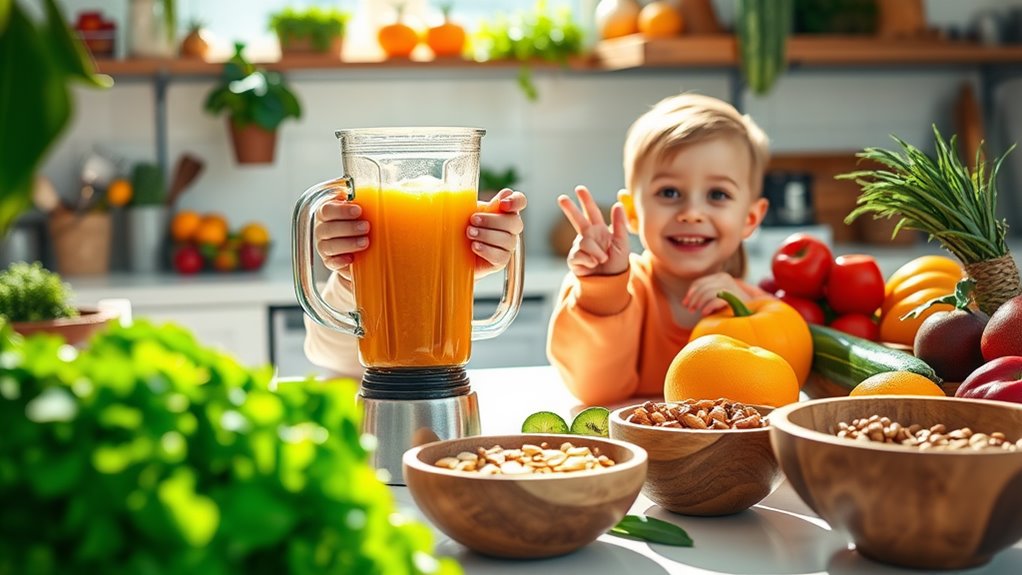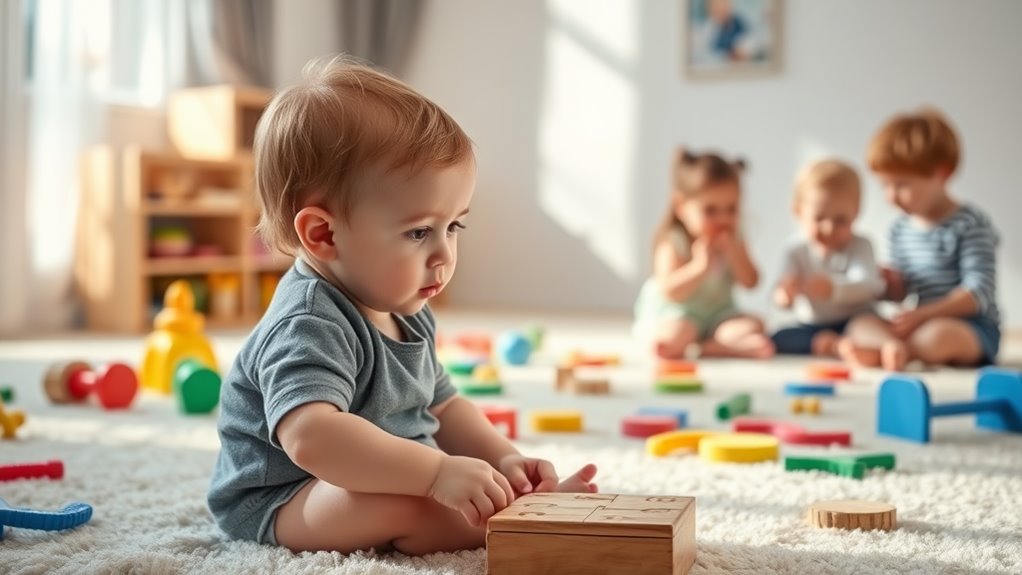Hydration and Its Impact on Physical Performance in Children
You might not realize it, but hydration is a key factor in how well your child performs physically. It affects everything from energy levels to muscle function, playing an essential role in their ability to compete and enjoy sports. When children don’t drink enough, they risk fatigue and overheating, which can hinder their performance and enjoyment. Understanding the signs of dehydration and the proper fluid intake for their age could make a significant difference. So, what does it take to guarantee your child stays properly hydrated and performs at their best?
Importance of Hydration
Why is hydration essential for children’s physical performance? Well, think of your body as a high-speed race car. Just like a car needs fuel to zoom around the track, your body needs water to perform at its best. Staying hydrated helps keep your energy up and your muscles working smoothly during activities like running, jumping, or playing sports.
When you’re well-hydrated, you can focus better, react faster, and feel more enthusiastic about everything you do. Water also plays a big role in regulating body temperature. When you’re sweating during a game, your body loses fluids, and if you don’t drink enough, you might feel tired or even dizzy.
Nobody wants to be the one who’s to sit out because they didn’t drink enough—talk about a bummer!
Effects of Dehydration
Dehydration can hit kids hard, affecting both their performance and overall well-being. When you don’t drink enough water, your energy levels can drop faster than a balloon losing air. You might feel tired, cranky, or even dizzy—definitely not the best combo for a day on the field or in the gym.
Your body relies on water to keep everything running smoothly. Without it, your muscles can cramp, and your focus can fade. Imagine trying to play your favorite game, but your legs feel like jelly, and your brain’s in a fog. Not fun, right?
Dehydration can also affect your body temperature. When you’re active, you sweat to cool down, but if you’re low on fluids, you can overheat. That can make you feel sluggish and less ready to tackle that big play or sprint to the finish line.
Signs of Dehydration
You mightn’t realize it, but spotting the signs of dehydration in yourself or your friends can make all the difference during sports or playtime. When you’re not drinking enough water, your body starts sending out signals to let you know. One of the first signs is thirst. If your mouth feels dry or you’re craving a drink, it’s time to hydrate!
Another sign to look out for is dark urine. If it’s not the usual light yellow color, your body may be telling you it needs more fluids. You might also notice that you’re feeling tired or sluggish. This can happen when you’re dehydrated, making it tougher to keep up with the game.
Don’t forget about headaches! If you’ve got a throbbing head, it could be your body’s way of saying, “Hey, I need some water!”
Finally, if you start feeling dizzy or lightheaded, that’s a clear indication that you need to take a break and drink up. So, keep an eye on these signs, and make sure you and your friends stay hydrated. After all, no one wants to be the one sitting out because they forgot to drink!
Hydration Guidelines for Children
Staying hydrated is key to maintaining peak performance during physical activities, especially for children who are still growing and developing. You mightn’t realize it, but even slight dehydration can slow you down and make you feel tired.
So, what can you do? First, drink water throughout the day, not just when you’re thirsty. Aim for at least 6 to 8 cups daily, depending on your activity level.
Before you start exercising, drink a cup of water about 30 minutes ahead. This prep helps your body get ready to sweat!
During physical activities, take sips every 20 minutes or so. When you finish, grab another cup to replace what you’ve lost.
Fluid Needs by Age
Understanding fluid needs varies by age is essential for ensuring children stay hydrated during physical activities. Kids aren’t all the same, and their fluid requirements change as they grow.
For toddlers, around 4 to 8 cups of fluids a day is usually enough. They’re like little sponges, soaking up everything, but they need water, too!
As children reach school age, their needs jump to about 5 to 10 cups daily. This is the time when they’re running around at recess, playing sports, or just being, well, kids! You’ll want to keep an eye on their water bottles.
For teens, hydration needs can reach up to 10 to 14 cups, especially if they’re active in sports or outdoor activities. It’s like fueling a race car—you’ve gotta keep that tank full!
Timing of Fluid Intake
Knowing how much fluid kids need is only part of the equation; when they drink is just as important. You wouldn’t fuel a car only halfway, right? The same goes for kids during physical activities. Make sure they’re sipping water before, during, and after exercise. It’s like watering a plant—you wouldn’t wait until it’s drooping to give it a drink!
Before they start running around, having a glass of water about 30 minutes beforehand can set them up for success. During games or sports, remind them to take short water breaks, especially if they’re playing hard. A good rule of thumb is to drink every 15 to 20 minutes. This keeps their energy levels up and helps them stay focused.
After they finish, encourage them to rehydrate again. Their bodies need to recover, and that means more water! But don’t just dump a gallon on them all at once; small sips are better.
Timing their fluid intake can make a huge difference in how well they perform. So, keep those water bottles handy and remind them that hydration is key to having a blast while staying active!
Best Hydration Sources
When it comes to keeping kids hydrated, not all drinks are created equal. Water’s your best friend here! It’s simple, invigorating, and does the job without any added sugars or calories.
Encourage your child to drink water throughout the day, especially during meals and snacks.
If you’re looking to mix things up, consider adding some fruit slices to their water. Lemon, strawberries, or cucumber can make hydration a bit more exciting. Plus, it looks fancy, and who doesn’t like a splash of color?
Milk is another great option! It’s packed with calcium and helps keep bones strong while quenching thirst.
Just keep an eye on flavored milks—they can sneak in extra sugars.
Coconut water is a fun alternative too! It’s natural and loaded with electrolytes, making it a tasty treat.
But remember, sugary drinks like soda or juice might seem tempting, but they can actually lead to dehydration.
Hydration During Physical Activity
Staying hydrated during physical activity is essential for kids to perform their best and enjoy their playtime. When you’re running around, playing tag, or kicking a soccer ball, your body loses water through sweat. If you don’t drink enough, you might start feeling tired, dizzy, or even cranky—like a balloon that’s lost its air!
To keep your energy up, make sure you sip on water before, during, and after your activities. It’s like filling up your gas tank before a road trip; you wouldn’t want to run out of fuel halfway through!
If you’re playing for a long time, don’t forget to take breaks and have some water. You can even make it fun: challenge your friends to a water-drinking race during breaks! Just remember, a water bottle is your best buddy on the field.
Also, watch out for signs of dehydration. If your mouth feels dry or you’re not sweating as much, it’s time for a drink.
Staying hydrated helps you stay focused, run faster, and just have more fun. So grab that water bottle and get ready to play!
Role of Electrolytes
While you might think water is all you need to stay hydrated, electrolytes play an essential role in keeping your body functioning well during physical activities. You’ve probably heard of them—sodium, potassium, calcium, and magnesium are just a few. These little minerals help balance fluids in your body, which is super important when you’re sweating it out on the field or court.
When you exercise, you lose electrolytes through sweat. If you don’t replace them, you might feel tired, cramp up, or even get dizzy. Imagine trying to run a race with a flat tire—your performance would suffer, right? That’s what happens when your electrolyte levels drop.
Hydration and Cognitive Function
Proper hydration isn’t just essential for your muscles; it also plays a significant role in cognitive function. When you’re well-hydrated, your brain can think more clearly, focus better, and remember things more easily.
Imagine trying to solve a math problem with a thirsty brain—it’s like trying to run a race with no shoes!
Studies show that even mild dehydration can lead to trouble concentrating or feeling more tired than usual. You might find yourself daydreaming in class, and that’s not what you want when you’re trying to learn.
Drinking enough water helps keep your mood stable, too. Nobody wants to be grumpy or irritable because they forgot to sip on some H2O!
Encouraging Healthy Habits
To foster healthy habits in children, it’s important to make hydration a fun and engaging part of their daily routine. You can start by letting them pick their own water bottles—maybe one with their favorite superhero or a bright color! This little touch can make them excited to drink more water.
Next, turn drinking water into a game. You could set hydration goals and reward them with stickers or tokens when they reach those goals. A little friendly competition with siblings or friends can also encourage them to drink up.
Don’t forget about flavor! Adding slices of fruits like lemons, oranges, or berries can make plain water taste like a treat. It’s a simple change that keeps things interesting.
You might also create a schedule for hydration breaks, especially during playtime or while doing homework.
Remember to lead by example—children often mimic what they see. So, if you’re sipping water regularly, they’ll be more likely to do the same.
Keeping hydration fun and engaging will help your kids develop healthy habits that stick with them for a lifetime!
Parental Influence on Hydration
Parents play a pivotal role in shaping their children’s hydration habits. You mightn’t realize it, but your actions and choices can really influence how much water your kids drink. When you grab a water bottle before heading out, you’re showing them that staying hydrated is important.
Plus, kids are great imitators—if they see you drinking water regularly, they’re more likely to do it too!
Making water fun can also help. Try adding slices of fruit or letting your kids pick their own water bottle. If they think it’s cool, they’ll be more enthusiastic to drink up!
Remember, hydration isn’t just about chugging water during sports practice; it includes drinking throughout the day, especially during hot weather or after playing outside.
Don’t forget to pack water for events or trips! When you make hydration a priority, you’re setting your child up for success in sports and activities.
And hey, if they’re well-hydrated, they’ll feel better and perform better! So, let’s raise those water bottles and make a splash in the hydration game together! After all, you’re their biggest cheerleader!




